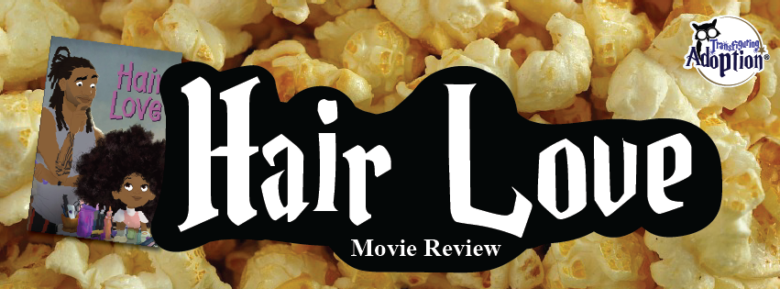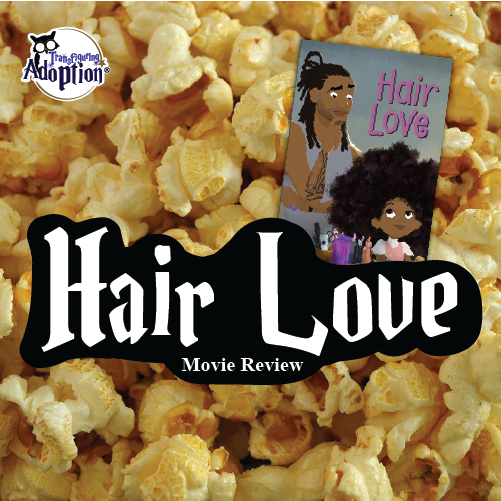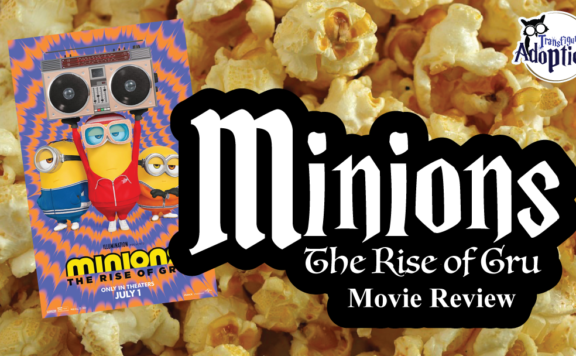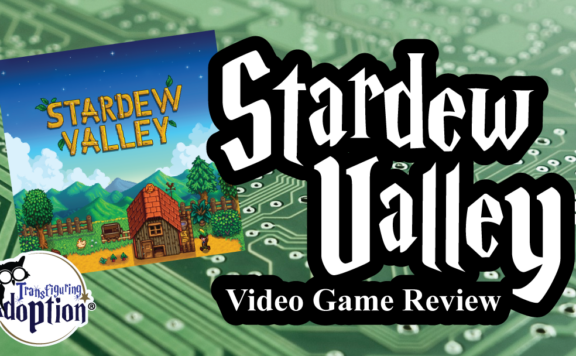Grade:
Transfiguring Adoption awarded this short film 5 Hoots out of 5 based on how useful it will be for a foster/adoptive family. [Learn more about our Hoot grading system here]
Movie Info:
From the Cover of Hair Love by Sony:
“Hair Love is a short story film by Sony that tells the heartfelt story of an African American father learning to do his daughter’s hair for the first time.”
I’ve heard tons of people across my social media rave about this short film on YouTube, but I never had the time to watch it. When it won an Oscar I knew I had to check it out. The short is wonderfully done and beautifully describes the work and love that goes into a dad learning how to do his daughter’s hair. I was talking to my friend Christina, who works in social services in Illinois, and she shared that when she was younger it was a learning curve for her dad to style her natural hair after her parents divorced. She went on to say “If there was a gap in our own communication, it’s an even bigger gap in cross-cultural adoptions”, which I think perfectly sums this short up. Overall this short is definitely one to watch as a family or even alone to help families understand how to navigate cultural differences, not just with hair but also in everyday lives.
** Spoilers Could Be Ahead **
How Is This Relevant To Adoption & Foster Care?
Many times our children come from racial and cultural backgrounds that are different than our own. What works for one person’s hair may not work on the next and taking the time to understand how to properly care for their unique hair is a show of love. Many people, especially girls, identify themselves with their hair. Taking the time to learn how to style their hair signals that you are taking the time to love them.
But this short isn’t just about hair. It’s about stepping outside of our comfort zone to help others feel comfortable with who they are. It’s about celebrating culture. It’s about teaching children to take pride and love every part of themselves that makes them unique or a part of a proud heritage. As caregivers, we have to recognize that many of our children arrive at our home with the belief that people don’t care about them. Meeting our children where they are at in terms of hair care, food, religious/spiritual/cultural beliefs, etc. is an extension of showing that we love and care about them just as they are.
There is a quote in the film that says “The road ahead might look rough but you can make the journey with a little bit of work and a whole lot of love”. Fostering and adopting is hard, and the road might look rough. At the end of the journey with a little bit of work and a whole lot of love, it’s totally worth it.
Discussion Points:
- Comparing yourself to others
The girl in the film compares herself to others on social media, much like other children her age or older. While it’s easy to feel down when things feel unsure and scary caregivers can work with their children on their self-image while learning self-care tasks. - Not giving up
The dad in the film almost gave up when he wasn’t able to do his daughter’s hair at first. However, he did not give up and was able to succeed in the end, making his daughter happy. Sometimes we fail a few times before succeeding, but if we give up without ever trying then we are never able to enjoy the feeling of success. - Being beautiful just the way you are
The mom at the end appears to be self conscious about the fact that she doesn’t have hair anymore. When her daughter gives her a hand drawn portrait showcasing her as a queen with no hair, the mom recognizes that with or without hair she is still beautiful. Our children come with all sorts of scars, some internal and others external. Our children should know that despite their differences, they are always beautiful even if they do not feel like they are.
Cautionary Points:
- Single parenting
The film shows the little girl and her father struggling with single parenting. While the family is intact with this example (since mom is only gone temporarily for cancer treatment) this can still be a reminder of separation from loved ones or parents for littles that have struggled with temporary or permanent separation from their family. This also shows all the struggles of dad figuring out care for his daughter that he may not have been taught in his own culture and having to navigate unique care tasks needed for a little girl with textured hair. - Hospital
The father and his daughter go on an outing and it turns out that they are going to a hospital. Many of our children have medical trauma or have seen a loved one sick or dying in the hospital, so this may trigger some distressing memories. - Cancer
The little girl is so excited to see her mother at the hospital. The mother is happy to see her too, but when she pulls off the scarf on her head, is shows that she has no hair. It is implied that the mother has cancer. If any of your children have seen a loved one struggle with this disease and the side effects of hair loss from chemo, then it may be troubling for them.
Discussion Guide:
These are just a few questions that can be used to connect with your children after the movie. These questions are not meant to be used in a therapeutic manner, but will help your child talk about some of their thoughts and feelings that have never been talked about before.
1. If you could change something about your appearance- what would that be?
Caregiver Notes: This question isn’t meant to let your child complain about their appearance, but to help you understand what they may be self conscious about. This allows you as a parent to use that information to help build them up in the future.
2. It’s not always what we say but what we do that shows how much we care. How can you show someone you care about them?
Caregiver Notes: Words are hard. Sometimes we just can’t find the words to say how we feel but our actions can. Helping them identify ways they can express their love will give them additional tools in navigating with family, friends, and loved one.
3. How can someone show you that they love you?
Caregiver Notes: If you’ve ever heard of Love Languages (if you haven’t, go look it up now) then you know that everyone feels loved through various things. Helping your child verbalize what makes them feel loved allows you as a parent to use their love language to strengthen your bond with them.
4. Have you ever had to visit someone you cared about in the hospital? If so, what could you do to show them that you love them?
Caregiver Notes: Hospitals are scary, especially when you are a child and you only have negative experiences with them. Teaching them empathy and allowing them to identify how they can show people they care is a great skill for them to learn. Whether it’s a hand drawn card, a balloon, or a drawing, they are learning how to express their love for people in various ways.
5. The family had to work together to help the girl achieve her dream hairstyle. What can we do as a family to help you succeed in your dream?
Caregiver Notes: Many of our kids have big dreams. They want to be the president, they want to live on the moon, they want to own a unicorn. Letting them talk about their dreams and saying how their family can help allows the family to work towards a common goal- even if it seems silly to us.
About the Author: Pattie Moore
Pattie lives in Tampa, FL, and she spends most of her time working with adoptive and foster families through case management, psychiatry services, and therapy services. Pattie received her bachelor’s in psychology from Saint Leo University and her master’s in Marriage and Family Therapy from Argosy University. Pattie has been certified as an adoption competent provider through Rutgers University. Pattie has also participated in the Infant Mental Health certification program through University of South Florida, and is currently working on her CPP (child parent psychotherapy) certification. Pattie is also a current Guardian Ad Litem for Hillsborough County that specializes in working with teen girls in human trafficking. When Pattie isn’t working, you can find her at Universal and Disney with her husband and friends.
**Transfiguring Adoption is a nonprofit organization seeking to nurture growth in foster and adoptive families by giving a HOOT about their families. Transfiguring Adoption does not intend for its reviewers nor its review to be professional, medical or legal advice. These reviews and discussion guides are intended to help parents to better be able to connect and understand their children who come from traumatic backgrounds.



